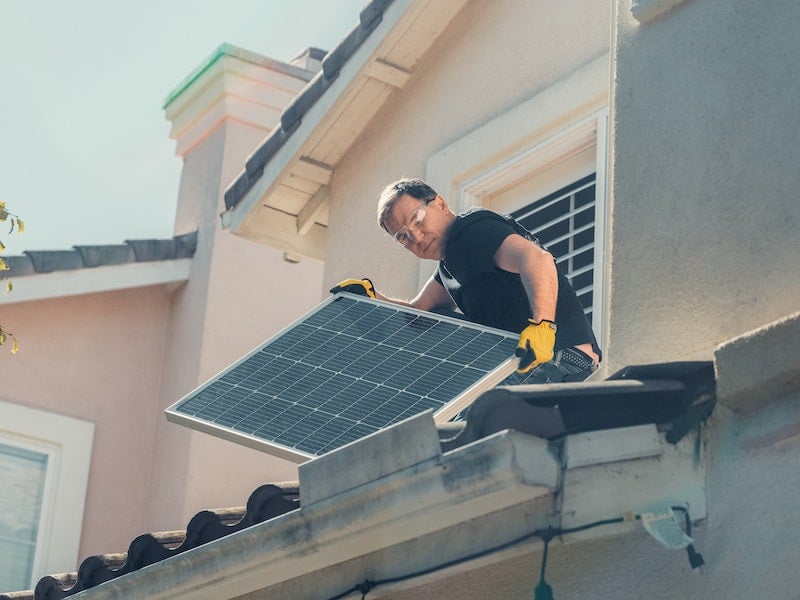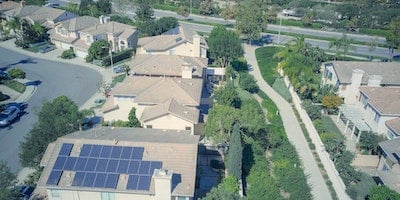
Buying vs. Leasing Solar Panels: Pros and Cons
Thinking about switching to solar? This guide discusses the pros and cons of different solar panel purchasing options.
Is solar right for you?
Find out in less than a minute.
If you're thinking about investing in solar technology, you'll find plenty of different ways to do so. Some homeowners choose to rent solar equipment from a solar company. Others choose to buy solar equipment, making fixed monthly payments for as long as necessary. Whether it's better to own or lease solar panels depends on your unique situation. First, you'll need to understand your options and how they differ.

How Does Leasing Solar Panels Work?
Leasing solar panels allows you to access solar energy's financial benefits without buying your own home solar system. A solar provider will install the equipment and charge you a fixed monthly fee.
A solar lease could save you money on your electricity expenses. Most solar lease contracts last for a couple of decades, during which time the provider will keep an eye on the system's hardware and performance. At the end of your lease, you can choose to:
- Renew your lease agreement
- Purchase the system
- End your lease agreement
Solar Power Purchase Agreement (PPA) vs. Lease
How does a solar power purchase agreement (PPA) differ from a solar lease? If you're not familiar with the ins and outs of the solar industry, the two options might seem interchangeable — in reality, a PPA and a lease vary in important ways:
- Lease: In a solar lease, the homeowner signs a contract to borrow solar equipment for a set number of years. During that time, the homeowner's relationship with their utility company is the same as it would be if the homeowner purchased the solar system. In other words, the homeowner can take advantage of net metering policies and similar utility programs. The homeowner pays a set monthly fee to the solar company for the duration of the lease.
- PPA: A PPA works differently. The homeowner does not own or lease the solar equipment. Instead, the PPA company owns the equipment. They sell the homeowner the electricity it produces at a set rate per kilowatt-hour or a fixed amount per month.
How Does a Solar Panel Lease Transfer Work?
Transferring solar panel leases can get complicated. If you're selling a home with leased solar panels, you'll have to either cover the remaining lease payments or find a buyer who's willing to take them over. Sometimes, sellers have to reduce their home's price to entice buyers.
In addition, the buyer will have to meet the solar company's minimum credit standards to be able to take over the lease. Leased solar panels, when buying a house, also affect the borrower's debt-to-income ratio, which can complicate qualifying for home loans.
Leasing Solar Panels Pros and Cons
Plenty of reasons might compel you to sign a lease or PPA for solar rather than outright buying the equipment. Borrowing solar equipment offers many unique advantages. However, it also has disadvantages when compared to buying.
Benefits of Leasing Solar Panels
If you're trying to decide whether you want to buy or lease solar equipment, it's helpful to weigh the pros and cons of leasing. Here are some of the benefits of leasing solar panels rather than buying:
- Good for those with low tax liability: One of the main reasons to buy solar panels is that it allows you to claim the renewable energy investment tax credit (ITC). With that said, if you have a low tax liability, some or all of the ITC will go to waste. Those with minimal tax liability might see a greater financial benefit from leasing solar equipment.
- Accessible for those with credit issues: Those with less-than-perfect credit scores often opt for a solar lease or PPA. It's much easier to qualify for borrowing solar equipment than buying it. In fact, credit score alone can be the deciding factor.
- Offers faster savings: Buying solar technology is a long-term investment, and savings might not occur right away. A lease or PPA program is more likely to offer you immediate savings per month, with no down payment or significant up-front costs. If you're looking to decrease your monthly bills from the get-go, a lease may be the better option.
- Offers various payment plans: PPA plans might offer variable monthly costs based on how much energy your solar equipment produces. Depending on how much energy you use, a variable cost might save you more money than a fixed monthly cost. It's a good idea to explore these options.
Disadvantages of Leasing Solar Panels
Of course, leasing solar panels also has its disadvantages. Here are some reasons you might want to buy instead of lease:
- Complicates home selling: Having a solar panel lease or PPA could hinder your ability to sell your home. At a minimum, it will complicate the home transfer process and may limit who is eligible to buy your home.
- Limits financial benefits: Many of the financial incentive programs for solar panels require you to own the equipment. When you lease, the company that owns the equipment will claim all the tax incentives it incurs.
- Sets a time limit: If you're looking for a long-term investment with benefits that increase with time, buying is often the better option. Keep in mind, when your lease runs out, you'll lose the financial benefits unless you decide to resign. On the other hand, making payments towards buying solar equipment means you'll eventually own it. If you want a lifetime energy solution, buying is preferable.
Leasing vs. Buying Solar Panels
Deciding whether to lease or buy solar panels is a big decision. Weigh all your options and consider your personal goals. You may also want to meet with a personal financial advisor to help you evaluate the various choices.
When Should You Buy and When Should You Lease?
If you have a strong credit score, reasonably high tax liability and you're looking for a long-term investment option, you may want to buy the solar equipment. If you have an imperfect credit score, low tax liability and you're looking for immediate savings, you may want to lease instead.
Once you've decided to lease solar equipment, think about whether you'd prefer to pay a set monthly amount or a variable amount depending on the energy you use. This will help you choose between a traditional lease or PPA plan.

Lower Energy Costs With EnergyBot
Whether you decide to sign a solar lease or buy the equipment, you can help the environment by joining the alternative energy movement. Another great way to do so is by switching to a 100% renewable energy plan, which is offered by many energy providers. While you won't get the same cost-saving benefits and tax incentives that come with owning or leasing solar panels, you'll still be able to rest easy knowing you've significantly reduced your home's carbon footprint.
If you're looking for ways to lower your energy costs, consider using EnergyBot. With EnergyBot, you'll get matched with the best energy plan for you in minutes. Start comparing rates with EnergyBot to see how much you could save.
Written by Thad Warren
Thad is a native Texan who has worked in the energy industry for just over 5 years.
Connect
Recent Posts
Compare Texas Solar Buyback Plans
Discover the best Texas solar energy buy back programs for 2025! Compare rates, terms, and providers to maximize savings and make the most of your solar investment.
September 2025

7 minutes

How Efficient Are Solar Panels
How efficient are solar panels compared to other types of energy generation?
March 2023

4 minutes

What You Need To Know About The California Solar Mandate
Learn how the California Solar Mandate changes how new homes are built.
July 2023

4 minutes


